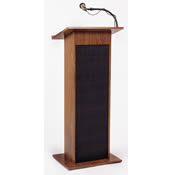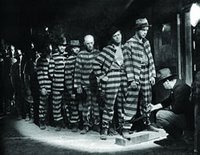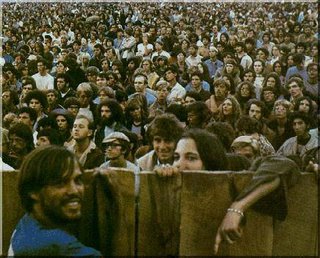
Would I sound too much like the kind of guy who spends several hours each week cross-indexing his mint-condition collection of punk, ska, and indie rock vinyl if I began a post by saying something like "The other day I was thinking about what is arguably the second-greatest public statement by a member of the Sex Pistols..." Probably. But at least I wasn't cross-indexing my vinyl when I thought about Johnny Rotten's famous quip from the stage of the last Sex Pistols concert: "Ever get the feeling you've been cheated?" The show at the Winterland in San Francisco had been a real train-wreck, and Rotten meant, in his own way, to sort of apologize to the crowd by laying down that question and walking out. No, I wasn't checking my reference files for some arcane detail about how to organize the "American Punk, 1975-1979" subsection by record producer (though far be it from me to sneer at such a nobly geeked-out project) when I thought of Rotten's question. Instead, I was looking at the lineup for this fall's On the Run Reading Series, which I co-ordinate with my colleague Davis Schneiderman.
It isn't that I think Davis and I are working some poetic/academic version of the Great Rock and Roll Swindle (though I've always thought Davis has a little whiff of Malcom McLaren about him). No indeed. I mean, I think we've got a pretty sharp lineup, even a kind of edgy one for our leafy corner of the liberal arts. It's that I've never really been happy with the format for poetry readings, and have rarely met anyone who has been. And when I give them myself, I sometimes feel (I know, I know, delusions of grandeur) an emotion like Johnny Rotten's at the end of the Winterland concert. Looking out over the eager-to-split-and-get-a-drink crowd, I sometimes feel like saying "Ever get the feeling you've been cheated?"
And I'm not alone in feeling that most poetry readings can be kind of a drag. (A note to the inevitable reader who's going to send me blistering email saying, "My readings are different, because they're special and I really care about the audience experience": yeah, okay, you're different. And so's your favorite poet who gave that immortal reading in South Beach. You're both alright. You have beautiful souls and it shows, man). I mean, I hear polite complaints from all quarters: my pals in the freakstream of poetry as well as my acquaintances from what passes for the mainstream big-league of the art. Sometimes someone comes up with some ideas for how to reshape the format for poetry readings, too. Remember Dana Gioia's little checklist at the end of Can Poetry Matter?,  where he suggested interspersing poetry with music, and having poets read famous poems by the late great versifiers? There may be something to this idea that the performances could be different. I mean, the most crowd-pleasing poets I've seen have been those who depart from the usual "I'm reading some poems from my book" format: at Lake Forest I recall Andrei Codrescu knocking 'em dead by sort of projecting persona for an hour, with the occasional poem thrown in, or Michael Donaghy impressing with virtuosity, reciting all of his poems from memory. So maybe there's something to be done with changing what we do at the lectern. Getting rid of the lectern might be a big part of it.
where he suggested interspersing poetry with music, and having poets read famous poems by the late great versifiers? There may be something to this idea that the performances could be different. I mean, the most crowd-pleasing poets I've seen have been those who depart from the usual "I'm reading some poems from my book" format: at Lake Forest I recall Andrei Codrescu knocking 'em dead by sort of projecting persona for an hour, with the occasional poem thrown in, or Michael Donaghy impressing with virtuosity, reciting all of his poems from memory. So maybe there's something to be done with changing what we do at the lectern. Getting rid of the lectern might be a big part of it.
But what if a big part of the problem with poetry readings isn't a matter of what's up on stage, but a matter of what's down in the seats? (And no, I'm not referring to the butt-punishing chairs devised by the enemies of aesthetic experience and fiendishly distributed to bookstores, universities, and art galleries worldwide). What if part of the problem is the audience -- or, rather, the expectations and goals of the audience? What if they come for motives that are bound to generate dissatisfaction?
(Observe me duck beneath my desk, fearing a barrage of incoming hatred. Watch as I wait a moment, then sheepishly poke my head back up from behind desk and laptop, look cautiously around, and resume typing).
First cautious disclaimer: No, I don't mean that poets inevitably put on a great show, and the philistines fail to appreciate it. Believe it or not, oh adoring multitudes, I myself have sucked tremendously at times (uh, sorry, crowd at The Hideout, for that one time. Those of you that know, know, and those of you who weren't there, well, count yourselves lucky). Oyez.
Second cautious disclaimer: I am always grateful and happy when people come to my readings.
Third cautious disclaimer: No, I don't think I've figured out how to do a better reading than you have.
Fourth cautious disclaimer: No, I don't want to blame the audience, or not exactly. I want to say that, in many instances, there's a disconnect between what audiences come to readings for, and what readings actually provide. And I'm not sure that the readers can actually provide what the audiences are looking for.
So check this out. Years of lurking around colleges, bookstores, and various venues of an arty ilk have led me to categorize the varieties of poetry reading audiences into five main categories. (Audiences can be hybrid, but in their distilled form here are the basic types of audience, the constituent sources of any such hybrids):
4.A. The Dragooned Student Audience. You know who these people are. You were one of these guys the first time you went to a reading. You may have press-ganged a few of these audiences together on your own, oh my colleagues. And what do such audiences want? Well, lots of things. Sometimes they really want to hear poetry. Some of the time, though, what some  of the people want it is extrinsic to the whole "poetry, delivered orally" prescripton we've written out for them. Sometimes they want to know they'll pass the test, or get a chance to sign the sheet, or hook themselves up with the extra credit (not unreasonably, and not always -- but this is a function of the system we set up when we dragoon people into an event). So sometimes people come thinking of the reading as a chore, and end up enjoying the reading about as much as they'd enjoy an annual check-up at the dentist's office. I was one of these guys, even when I went to readings by poets I'd have enjoyed under other circumstances -- there's something about being told to do something that sucks all of the fun out of the event. (Even as I type this, I gird my loins for battle at my home institution, where some faculty are pressing for a system in which students are to be required to attend a certain number of intellectual events every semester. Every bone in my body cries out against such institutionalized infantalizing of the students...uh, except the one bone that's connected to the part of me that sometimes gives extra credit for hitting the reading...)
of the people want it is extrinsic to the whole "poetry, delivered orally" prescripton we've written out for them. Sometimes they want to know they'll pass the test, or get a chance to sign the sheet, or hook themselves up with the extra credit (not unreasonably, and not always -- but this is a function of the system we set up when we dragoon people into an event). So sometimes people come thinking of the reading as a chore, and end up enjoying the reading about as much as they'd enjoy an annual check-up at the dentist's office. I was one of these guys, even when I went to readings by poets I'd have enjoyed under other circumstances -- there's something about being told to do something that sucks all of the fun out of the event. (Even as I type this, I gird my loins for battle at my home institution, where some faculty are pressing for a system in which students are to be required to attend a certain number of intellectual events every semester. Every bone in my body cries out against such institutionalized infantalizing of the students...uh, except the one bone that's connected to the part of me that sometimes gives extra credit for hitting the reading...)
4.B. Cultivated Professionals Lured By the Aura of Something Connected to the Poet or the Venue. This isn't so much a campus poetry audience as it is an uptown kind of crew. You find them at museum readings, or at other big city venues. They're generally affluent, skew middle-aged, and show up because of some mojo associated with the poet (he or she is the current laureate, say) or some mojo associated with the institution (to which they have probably written a check at some point) -- they're not there to see the poet so much as they're there to be a part of the 92nd Street Y or whatever similar institution graces their city. This may be one of the more satisfied kinds of audience, in part because advanced age has extended their attention spans and raised their thresholds for boredom, and in part because much of what they're after (the idea of participation in something respectable among the high-cultural-capital-and-high-economic-capital set) is on offer. But the poetry part can seem a bit extraneous to the real reasons for showing up, experienced the way one experiences a fund-drive on PBS, as a necessary and well-meaning interlude to be endured. 4.C. Celebrants of their Own Ethnic, Sexual, or Regional Identity. Ever been to a Seamus Heaney reading at Notre Dame? What, no, really? Well, I'll tell you about it, man. There I was, at a Seamus Double Bill, Seamus Heaney and Seamus Deane. Along with the dragooned students (self included) and the cultivated professionals and the local poetry producers (more of which anon) was the Irish American community out in full erin-go-bragh force. I mean, they seemed to appreciate the reading, but part of me thinks that there were some who were disappointed that the two Seamuses didn't come out on stage wearing emerald suits and the kind of plastic kelley-green bowler hat one sees in Southie on St. Patrick's day. What was desired was a pure injection of eau d'Irelande, and it was inconveniently cut with a large dose of poetry. Nothing wrong with the readers or the audience, but each was about a very different thing.
4.C. Celebrants of their Own Ethnic, Sexual, or Regional Identity. Ever been to a Seamus Heaney reading at Notre Dame? What, no, really? Well, I'll tell you about it, man. There I was, at a Seamus Double Bill, Seamus Heaney and Seamus Deane. Along with the dragooned students (self included) and the cultivated professionals and the local poetry producers (more of which anon) was the Irish American community out in full erin-go-bragh force. I mean, they seemed to appreciate the reading, but part of me thinks that there were some who were disappointed that the two Seamuses didn't come out on stage wearing emerald suits and the kind of plastic kelley-green bowler hat one sees in Southie on St. Patrick's day. What was desired was a pure injection of eau d'Irelande, and it was inconveniently cut with a large dose of poetry. Nothing wrong with the readers or the audience, but each was about a very different thing.
4.D. Production for Producers: The Poetry Crowd Consisting of Poets. This is more of a downtown groove, though you get it at big universities too, and during literary conferences. Sometimes these people are really into the poetry, just as some dragooned students are, and some members of other kinds of crowds. But if the hoots of laughter at not really very funny stage banter and the craning of necks to look around and see who is there looking at you are any indication, there are ulterior motives afoot too. Some people go to be seen as members of the community, or to network furiously, seeking the kinds of face-to-face interaction that may lead to publications or readings or jobs or the like (not that that's a always bad thing -- every profession this side of hermit has some need for this stuff, and poetry has become a kind of profession, which is a whole other topic, and one that causeth the good-hearted to wring their pallid romantic hands). Some come for the opportunity to socialize post-reading with likeminded people, who may be thin on the ground at bars other than the one next to the reading -- again, nothing wrong with this, but it doesn't have a lot to do with listening to poetry at the reading.
4.E. The Slam Crowd. Like 4.D., above, but, you know... drunk.
So there you have it, class: the five elemental types of audiences, which can of course be mixed into various compounds. Did I leave anyone out? Probably. Let me know. But I think there's enough coverage here for the general point to be made: most poets aren't selling, and can't reasonably be expected to want to sell, what most audiences came to buy. Dissatisfaction seems inherent in the system.
Uh...well... check back with me later. I gotta go somewhere and, uh, do something... 
(Exit the blogger, pursued by his doubts and insufficiencies)

(Enter the blogger, accompanied by sentimental melodies from the string section. Emanating from his person is a Garrison-Keillor like folksy warmth redolent of hope and positivity etc.)
On a good day, I can think about poetry readings the way Marianne Moore thought about poetry when she wrote:
I, too, dislike it: there are things that are important beyond
all this fiddle.
Reading it, however, with a perfect contempt for it, one
discovers in
it after all, a place for the genuine.
On other days, I think of readings not so much as things I like to attend, but as things that I'm glad to have attended. In this they're a lot like travel: I dig it ahead of time, when I'm pawing through the Rough Guide and thinking about how clever I'm going to be when I pack three jackets, four pairs of shoes, a gallon of hair-care product, and three volumes of Gibbon's Decline and Fall of the Roman Empire into my carry-on for that long-awaited week in beautiful Kraplachistan. And I enjoy travel post-facto, when I see that it actually has Enriched Life. It's just the middle bit that's problematic, consisting of aching feet, misread train schedules, getting lost on the local metro, trying to find someplace to sit that isn't covered in pigeon shit, sneering with contempt at my demographic doppelgangers, the other tourists from Chicago, or somehow managing to lose part of a Q-tip in my ear and, due to language barriers, being unable to explain the problem to the bemused locals.
So anyway. What was my point? Oh yeah, check out this year's readings at Lake Forest. Eventually, you'll feel good about it.
No comments:
Post a Comment